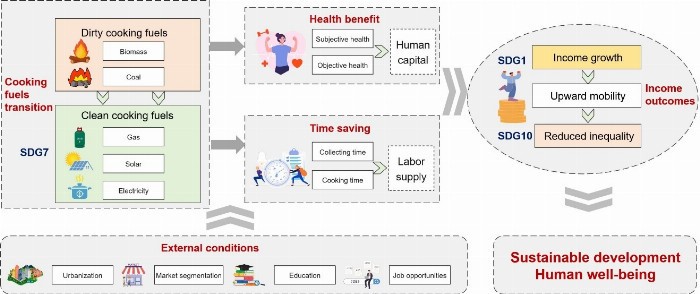
Figure: Theoretical framework for synergizing multiple Sustainable Development Goals, from Li, C., Li, M., Zhang, L., Li, Q., Zheng, H., & Feldman, M. W. (2025), Energy–poverty–inequality SDGs: A large-scale household analysis and forecasting in China. [Photo provided to chinadaily.com.cn]
Imagine a world where access to clean energy not only powers homes but also lifts millions out of poverty and reduces inequality. Dedicated to achieving the United Nations' Sustainable Development Goals (SDGs), Chinese scholars have discovered that transitioning to clean cooking fuels can significantly promote multiple SDGs, including affordable and clean energy (SDG 7), no poverty (SDG 1) and reduced inequality (SDG 10).
Funded by the National Natural Science Foundation of China, Li Minglai, a PhD student at Xi'an Jiaotong University, together with his supervisor professor Li Cong, professor Zhang Lin's team at the City University of Hong Kong, professor Zheng Hua at the Research Center for Eco-Environmental Sciences under the Chinese Academy of Sciences, as well as overseas collaborators, have been conducting research on the income distributional impacts of the energy transition. Their research results, entitled "Energy-poverty-inequality SDGs: A large-scale household analysis and forecasting in China", were recently published in the top scientific journal Proceedings of the National Academy of Sciences (PNAS).
"Energy transition is often seen as driven by economic growth. However, our study shows that it can also boost inclusive income growth," said professor Li Cong.
The study starts from the mechanism in the state of household income distribution driven by energy transition, proposes an energy path to drive inclusive growth, and verifies a feasible direction to promote the synergy of multiple Sustainable Development Goals, the professor said.
Specifically, the study incorporates clean energy transition, human capital accumulation, labor supply and income distribution into a unified framework for systematic analysis, revealing the mechanism and boundary conditions for energy transition to drive common wealth, and provide theoretical support for advancing a just energy transition.
Through the scenario simulation of multiple energy transition paths, such as stove subsidies and fuel subsidies, it is found that energy transition as a whole has good economic feasibility and social benefits, the professor noted.
"The most challenging part of this study was uncovering how the energy transition improves income distribution," said Li Minglai. "We found that it enhances human capital and reallocates labour time."
The research not only provides important insights for China to accelerate the realization of its dual-carbon goals — reaching peak carbon emissions before 2030 and achieving carbon neutrality before 2060 — and promote common prosperity, but is also closely related to the United Nations' Sustainable Development Goals, which aim to be achieved by 2030. "Our study indicates that policymakers can incorporate the coupling of the SDGs into their decision-making, thus breaking the bottleneck of achieving multiple development goals within a limited time constraint," professor Zhang Lin added.